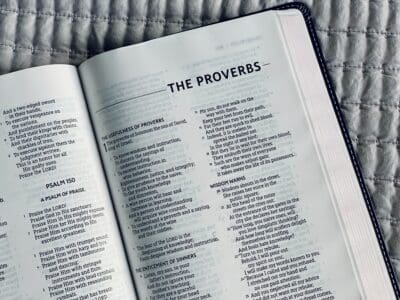1 Kings tells us of two men. Ahab and Elijah, who two took very different life journeys. I want to show you Ahab’s disobedient journey, and then, in a second article, show you Elijah’s faithful journey.
Meet Ahab
Ahab came to the throne about sixty years after the death of Solomon. He was the seventh king in line after that terrible schism in which ten of the twelve tribes declared independence from the line of David’s descendants.
Vast changes had taken place in just over half a century, “For Ahab it seemed like a light thing to walk in the sins of Jeroboam” (1 Kings 16:31).
Sins that had seemed shocking to one generation had come to seem light and trivial to the next. Older people, who could remember the days of Solomon, must have looked back and wondered, “What in the world happened in our nation?
He Broke the Commandment of God
He took for his wife Jezebel the daughter of Ethbaal king of the Sidonians, and went and served Baal and worshipped him. (1 Kings 16:31)
When God’s people entered the Promised Land, he gave them a clear command that they were not to marry, under any circumstances, people who worshiped idols (see Deuteronomy 7:3).
The issue here is not interracial marriage. We know that because Ruth, a Moabitess who took refuge under the wings of the Lord, married Boaz, and took her place in the line of Christ. God smiles on the marriage of a man and a woman of a different race when they marry in the Lord.
But God speaks clearly to his own people about entering marriage with someone who does submit to him. Ahab paid no attention to that. What did he care about old books written hundreds of years before his time? He would have said he was dealing with political realities. Assyria was growing in power and Ahab reckoned that the ten tribes of Israel needed a strong ally to bolster their defense.
The Sidonians seemed to be the answer, and what better way to cement an alliance with them than for him to marry the crown princess, the daughter of Ethbaal, whose name was Jezebel. So that is what Ahab did.
He Subverted the Worship of God
He erected an altar for Baal in the house of Baal which he built in Samaria. (1 Kings 16:32)
In the first commandment, God says “You shall have no other gods before me” (Exodus 20:3). What does that mean? There is only one God, but because our nature is to rebel against him, we invent other gods who fit comfortably with our pleasures.
What is the second commandment? “You shall not make for yourselves an idol” (Exodus 20:4). It’s interesting how sin progresses in a culture. When the ten tribes in the north separated from the two tribes in the south, Jeroboam wanted to stop his people from going to Jerusalem to worship at the temple, so he set up his own places of worship in Dan and Bethel.
Jeroboam made a golden calf for each location, and then he said, “These are your gods who brought you up out of Egypt” (1 Kings 12:28). “We are worshipping the same God, but we do it in our own place and we do it in our own way.”
Ahab goes a step further. He doesn’t even pretend to worship God. He builds a house for Baal, “We’re going to worship in a new way. We’re done with the Bible.” Not only does he break the second commandment; he breaks the first as well. Ahab felt he had the freedom to choose his own god as well as his own lifestyle.
He Provoked the Anger of God
Ahab did more to provoke the Lord… to anger than all the kings of Israel who were before him. (1 Kings 16:33)
The word “provoke” is important. Anger is not God’s natural state. The pagans believed in gods who were angry by nature. The Bible tells us that God is love. That is his nature. He doesn’t have to be provoked to love; He is love. The Bible never says that God is anger. But God hates evil, and when men pursue evil, he is provoked to anger.
He Ignored the Warning of God
In his days, Hiel of Bethel built Jericho. (1 Kings 16:34)
What is the significance of this verse? Back in the book of Joshua, we read about the mighty act of God in which he caused the walls of Jericho to fall down. After that great victory, Joshua gave an instruction from God that no one was to rebuild the city (Joshua 6:26).
Nothing could be clearer than this. There is a commandment of God not to rebuild this city: But what does a man like Ahab care about that? “Old documents, written hundreds of years ago, about a city whose walls fell down at the blowing of trumpets. Who believes that anymore?”
Ahab had turned from giving any weight to the Word of God. There was money to be made in a place like Jericho, so Ahab commissioned this man Hiel to rebuild the city.
In the time of Ahab, the people saw the books of Moses as just words, God talk. They felt that God was passive—they could do what they wanted and nothing would happen. Do you see this in our world today? People think God is only in people’s minds, not a living reality.
Ahab’s Journey
This is a story of the progress of evil in a person’s life and in society. It begins with disobeying the command of God. It continues by subverting the worship of God—if this god does not suit us, we will reshape god in our own image. And, it intensifies in provoking the anger as God and it ends up with men and women ignoring the warnings of God.
As I’ve meditated on this, it’s clear to me that our beloved nation is on the same path. We define our own morality and choose our own gods. God says “I Am who I Am,” but instead of bowing before him and believing God is who he says he is, we redefine God, and we act as if God is who we say he is.
How have you redefined God, and how can you use Scripture to bow before who he actually is?






